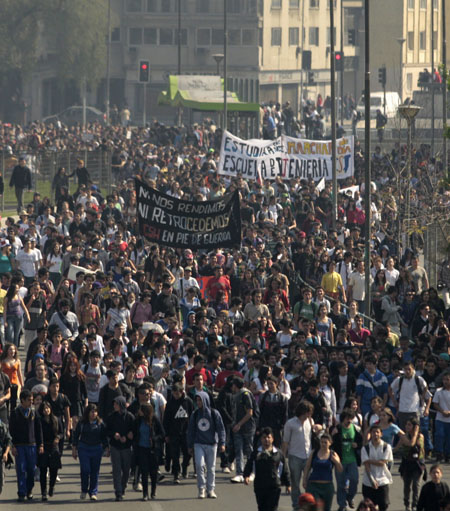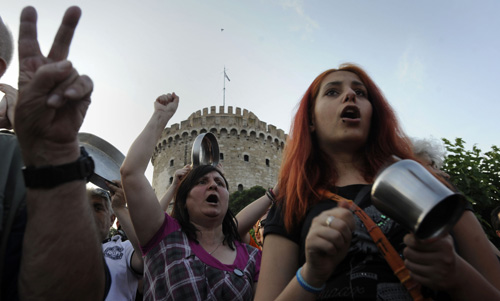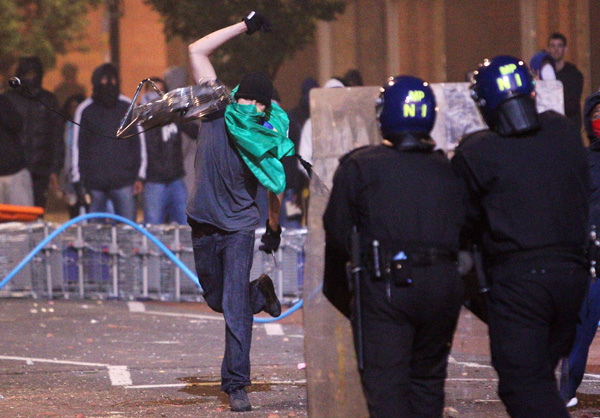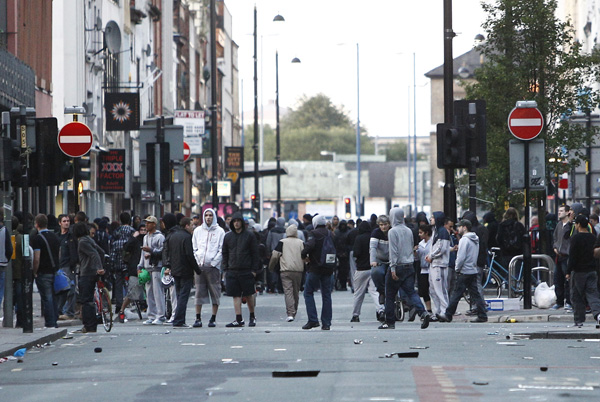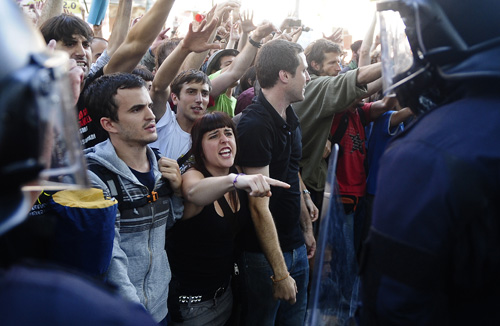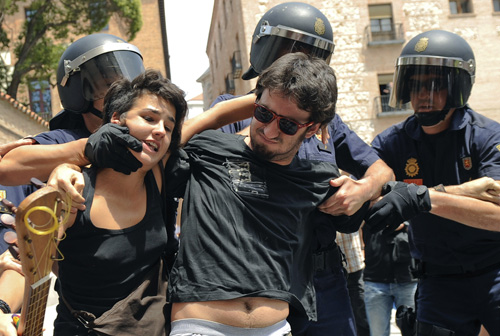Revolution #254, December 25, 2011
Voice of the Revolutionary Communist Party, USA
Please note: this page is intended for quick printing of the entire
issue. Some of the links may not work when clicked, and some images may be missing.
Please go to the article's permalink if you require working links and images.
- Occupy at a Crossroads
A Call for Mass Action Against the Suppression of the Occupy Movement
- Flier
(8.5x11, 2-sided, PDF)
- Flier
(Word file, for adding local contact information)
- BAsics: from the talks and writings of Bob Avakian
You can't change the world if you don't know the BAsics
- BA Everywhere
Imagine the difference it could make
A GREAT BEGINNING... EXCITING STEPS TO COME
- Uprisings,
Clashes Shake North Africa and the Middle East
- 2011: Inspiring Outbreaks—Crucial Challenges
- A Lesson About Liars
- December 14, 2011
U.S.-Israeli Assault on Iran Escalates, Danger of War Grows
by Larry Everest
- Coming Soon!
C-SPAN Broadcast of Carl Dix—Cornel West Dialogue at UC Berkeley
- BAsics for Prisoners:
GIVE THE GIFT THAT GIVES!
- Letter from Prisoner
on Occupy Oakland
- West Coast Occupy Port Shutdowns
- Call for volunteers to
transcribe interviews for the film,
Occasioned by the Publication of BAsics:
A Celebration of Revolution and the Vision of a New World
- On Choices... And Radical Changes
First, people don't make choices in a vacuum. They do it in the context of the social relations they're enmeshed in and the options they have within those relations—which are not of their own choosing. They confront those relations, they don't choose them.
Two, if people feel for whatever reasons that they want to choose to harm themselves and others, we're going to struggle with them—but we're not going to blame them. We're going to show them the source of all this in the system, and call on them to struggle against that system, and transform themselves in the process. Just because a youth "chooses" to sell drugs, or a woman "chooses" to commodify herself sexually, doesn't mean that they chose to have those choices. And there is no other way besides fighting the power, and transforming the people, for revolution that all this will change for the better. Blaming the masses for bad choices just reinforces the conditions that they are oppressed by.
In sum, people do make choices—but they make them enmeshed and confined within social relations that are not of their choosing. We have to bring into being different social relations and conditions so that masses of people can act differently and relate differently to each other. Fundamentally, that takes a revolution which is aiming for communism.
Bob Avakian,
Chairman of the Revolutionary Communist Party, USA
Occupy at a Crossroads
| |
As put forward in its statement “On the Strategy for Revolution,” the RCP, USA stands for and struggles for a world “where human beings everywhere would be free of relations of exploitation and oppression and destructive antagonistic conflicts, and could be fit caretakers of the earth. But to make this a reality, we need revolution.” That same statement emphasizes the importance of the way that crises in the system of imperialism can lead to “sudden jolts and breakdowns in the ‘normal functioning’ of society, which compel many people to question and to resist what they usually accept.” Such jolts “create situations in which many more people are searching for answers and open to considering radical change,” and pose important openings in the work of getting to revolution, and a whole new society.
The Occupy movement—both the unexpected and overwhelmingly positive nature of the protests and the brutal repression which the imperialist state has unleashed against it—has opened up just such a situation. From the standpoint of making revolution and carrying forward from there to communism—from the standpoint of building, and making leaps in building, the movement for revolution—it matters a great deal whether this broad Occupy movement will be able to surmount the repression that has been unleashed against it and go forward, or whether it will be shut down or derailed in one form or another. From that revolutionary communist standpoint, and with those stakes in mind, we are circulating this statement and call on people broadly to discuss, distribute, and post it. |
|
A Call for Mass Action Against the Suppression of the Occupy Movement
These past several months have witnessed something very different in the U.S. People from many different walks of life came together to occupy public space in nearly 1,000 cities in the U.S. They stood up to vicious police violence, they broke through the confines of “protest as usual,” and in the middle of all that, they built community. Even in the face of media attempts to ridicule, distort, and demonize these protests, their basic message began to get through. People throughout the U.S.—and even the world—took notice of and took heart from these brave and creative protesters.
The political terms of discourse began to shift; the iced-over thinking of people in the U.S. began to thaw. Standing up to the unjust brutality and arrests became a badge of honor. People began to listen to and read the stories of some of the victims of this economic crisis, and to share their own. And most of all, as the protests spread to city after city, the fact of people occupying public space forced open debate and raised big questions among millions as to what kind of society this is, and what it should be. Why does such poverty and need exist in the face of a relative handful of people amassing obscene amounts of wealth? Why do the political institutions of society seem only to serve that handful? Why do so many youth feel they face such a bleak future? Why does the insane destruction of the environment continue to accelerate? And what is needed to overcome all this?
Those who actually wield power in this country regarded these protests, and these questions, as dangerous, and reacted accordingly. Time and again those who wield power violated their own laws and ordered police to pepper spray, beat with clubs, and shoot tear gas canisters at the heads of people who were doing nothing more than non-violently expressing their dissent and seeking community. This reached a peak in the recent coordinated and systematic attacks of the past few weeks against all the major occupations. In fact, the mayor of Oakland admitted on BBC to being part of conference calls that coordinated national strategy against the occupiers. On top of all that, and in another blatant show of illegitimate force and power, they attempted to prevent journalists and photographers from covering these acts of repression—unless they were “embedded” with the police.
To put the matter bluntly, but truly: the state planned and unleashed naked and systematic violence and repression against people attempting to exercise rights that are supposed to be legally guaranteed. This response by those who wield power in this society is utterly shameful from a moral standpoint, and thoroughly illegitimate from a legal and political one.
Now this movement faces a true crossroads. Will it be dispersed, driven into the margins, or co-opted? Or will it come back stronger? This question now poses itself, extremely sharply.
One thing is clear already: if this illegitimate wave of repression is allowed to stand... if the powers-that-be succeed in suppressing or marginalizing this new movement... if people are once again “penned in”—both literally and symbolically—things will be much worse. THIS SUPPRESSION MUST BE MASSIVELY OPPOSED, AND DEFEATED.
On the other hand, this too is true: movements grow, and can only grow, by answering repression with even greater and more powerful mobilization.
The need to act is urgent.
As a first step in the necessary response, there must be a massive political mobilization on a day, or days, very soon to say NO! to this attempt to suppress thought and expression with brutality and violence. This mobilization should most of all be in New York, where this movement started... but it should at the same time be powerfully echoed all around the country and yes, around the world. This is a call for massive demonstrations—soon—carried out in public spaces where they can have maximum impact and exposure and where the authorities cannot pen in, suppress, and otherwise attempt to marginalize these demonstrations.
These demonstrations must be large enough to show clearly that people will not tolerate that which is intolerable... that people will not adjust to that which is so manifestly unjust. Such demonstrations, along with the efforts to reach out and build them, can draw many more people from passive sympathy into active support and can awaken and inspire even millions more who have not yet been reached. Such demonstrations can powerfully answer the attempt by “the 1%” to crush and/or derail this broad movement. Thousands and thousands in the streets, acting together, can seize new initiative and change the whole political equation. The urgent questions raised by Occupy—and other urgent questions that have yet to be raised in this movement—can once more reverberate, and more powerfully than before.
The repression of the Occupy movement must not stand. Act.
Send us your comments.
A Letter from a Prisoner on Reading and Studying BAsics
Dear XXX,
How are you doing out there? Well as for me trying to get by and taking one day at a time before I come home. Well I’ve been doing a lot of reading and studying and I read “The Revolutionary Potential of the Masses and the Responsibility of the Vanguard” [This is the supplement to Chapter 6 of BAsics, from the talks and writings of Bob Avakian.] and now I understand what you are doing and talking about and here I was thinking you lost faith in me. But all the time you are putting all your faith in me. To become a better man and into a revolutionary. The part I really enjoy reading was on page 199 where it talks about “there are plenty of people pandering to them and using them in various ways and feeling sorry for them. I hate the way the masses of people suffer, but I don’t feel sorry for them. They have the potential to remake the world, and we have to struggle like hell with them to see that.” And that’s the same way you think of us. Then on page 200 I really do feel like he is talking about me because I do have limitation and shortcoming as the result of living and struggling to survive under this system. and I was denied education that I really need it but access to knowledge about many spheres. hell I don’t even know what a sphere is, but I will be looking it up, and at one time I didn’t know how to read, but by me coming to jail and picking up books and just reading on my own that how I learn like way spell. And yes I was illiterate and in many ways I am still illiterate. but I am trying to overcome that and my eye was closed on most the things until I met you and you showed me the way to Bob Avakian. So people out there try to fake it and to make it but not me. Don’t get me wrong sometime its hard to study thing about the revolution because I don’t understand the words I be reading and thats what makes me want to give up. But I do want to become the emancipators of humanity. and then to act in accordance with that potential and Bob said best on page 202 where he including me by saying someone who got caught up in terrible things. They are also capable of great things. I in my pass I did go down the wrong road. but now I got a family that love me for how I am not for what I did in the pass and in that way made me change. its just I still have to finish my pass mistake and get off parole and then I can move on. but while I am doing that. I can start by learning new things and start being a men and help other. well my pen ran out and I don’t have a pencil so I will write back soon and tell you more.
your brother,
YYY
Send us your comments.
BA Everywhere
Imagine the difference it could make
A GREAT BEGINNING... EXCITING STEPS TO COME
Download PDF Poster of this article
April 2011 marked the release of BAsics, a book by Bob Avakian, the revolutionary leader who has developed a new synthesis of communism. This book of quotations and essays speaks to essential questions of revolution and human emancipation. On this occasion, a range of artists, musicians, dancers and actors from a diversity of perspectives came together in a unique cultural event to celebrate revolution and the vision of a new world.
The film, Occasioned by the Publication of BAsics: A Celebration of Revolution and the Vision of a New World, will tell the story of what those artists did and why they did it. It is a film for everyone who has dreamed of a different and better world or wondered how art and culture can be part of creating it.
Through the diverse efforts of hundreds of people across the country, we met and exceeded our fundraising goal of $23,000 for the production and release of this film. $25,002 was raised!
* * *
This is a very significant and exciting development! We look forward to hearing from the broad range of experience, why people contributed to this film and the larger discussions that were opened up in the process. A few things can be said about this now.
As we identified in the editorial “BA Everywhere... Imagine the Difference It Could Make,” raising money for this film, and other projects—including raising money to send copies of BAsics to prisoners, to sponsor “Revolution buses” to take the message out far and wide—is an opening stage of “a major, multi-faceted fundraising campaign to project BA, his voice and his work way out into society—far beyond what it is today. A fundraising campaign that will raise the necessary major money to make this possible. A fundraising campaign that unleashes and develops imagination, defiance, and community in everything it does.”
A whole range of creative and inspiring fundraising activities were part of raising the money needed to produce and release the film. A page at indiegogo.com/basicsevent served as the fundraising center. It has a trailer—a short preview clip—giving a taste of what the film will be like. Dozens of people, groups of people and teams, donated there. Among the comments by contributors: “A change is in the wind. People have the power”... “This is from an Iraq war resister who wants to see a world without the US military spread over it” ... “One step closer to spreading the word how humanistic things can be.” And, “As many come to see the system as the problem in this country, leadership to bring us to the other side is crucial. That’s why I support this....”
One highlight of the fundraising experience was an event in Chicago where 60 people, a diverse mix of ages and nationalities, came together at Chicago’s Elastic Arts Gallery for a benefit. A number of people commented that this gave them a little taste of what April 11 must have been like. Film clips of Avakian from ’69, ’79 and 2003 were shown, and for many people there it was their first time seeing BA. Spoken word artists, including teachers and students from a high school poetry slam crew, performed, and a band volunteered their services to be the “house band.” Several people bought BAsics after watching the film trailer. The headline performance was by Fred Lonberg-Holm and Tomeka Reid, renowned jazz cellists. At one point Fred said softly, “Thank you all for coming out for this very good cause. I only wish I could have been at the event this film is about, but you can’t be everywhere.” $1,400 was sent that night and over a dozen new people signed up to get more involved.
Around the country, house parties were held to raise money, from late-night scenes of people straight from Occupy protests to brunches. One group, mainly occupiers, found this fundraising drive compelling enough to raise $30. This was a group that included people with only a few dollars between them for food. Teams of fundraisers hit the phones—including people doing this for the first time. Some people went into housing projects and raised funds. People set up displays at holiday light displays and sold hot chocolate, spread the word, and collected donations.
Influential voices in the arts and politics weighed in, including director and producer Robert Young, filmmaker David Zeiger, Carl Dix, Cornel West, Sunsara Taylor, and writer Erin Aubry Kaplan. A performance at Chopin Theatre in Chicago, “Music with a Conscience, the Protest Music of George Flynn,” was a benefit to raise funds. In L.A. there was an event at Revolution Books with members from the revolution rock band Outernational and Revolution correspondent and radio host Michael Slate.
Celebrating... Fundraising... And Looking Ahead
“Fundraising—if it’s done right—does two things. It raises the money that is badly needed to make a huge difference; and it brings people together—in this case to engage with BA, and what he represents and the whole process of changing the world. And the fact is that there are many, many people who may not agree with everything BA stands for, or who feel that they themselves need to learn more about this, but who also understand very deeply how important it would be, what a difference it would make, to have this voice and vision being projected, and engaged and debated, by people in every part of society.” (From “BA Everywhere... Imagine the Difference It Could Make!” at revcom.us.)
Through a range of projects—each with its own identity and character—with people participating in different ways, from different perspectives, we have made a significant beginning in raising major funds to make Bob Avakian a household word in society: BA EVERYWHERE... IMAGINE THE DIFFERENCE IT COULD MAKE! A Mass Campaign to Raise Big Money to Get BA’s Vision and Works Into Every Corner of Society.
In this process, big questions are being opened up... bigger questions that people don’t normally have an opportunity to discuss—questions about Avakian’s new synthesis of communism, about the movement for revolution he is leading and the possibility of revolution in a country like the U.S., the history of socialist revolutions, human nature and whether a radically different world is viable, discussions about the concept of horizontal movements vs. the need for vanguard leadership... and people who came together got to learn about each other’s lives and experiences.
* * *
All this is a good beginning! We’ve begun to have an impact with this, and begun to see some of the significant things this mass campaign can unleash.
On Black Friday, the “biggest shopping day of the year,” people were challenged to help bring to life “the alternative to capitalism” by pitching in to buy copies of BAsics for themselves, and for prisoners. Over that weekend, money was raised to fill 340 prisoner requests for the book (as well as 130 more books sold, many in gift packs). The challenge remains to raise the money to send hundreds more copies of BAsics to prisoners.
Along with taking time over the holidays to get together with all the people that have been reconnected with, and to get together with friends and family, we’re going to take everything we’ve learned and build for year-end parties to raise money for the BA Bus Tour that will kick off in 2012. Gather people together for year-end celebrations of the debate and engagement we’ve been getting going with a radically different and far better vision of how the world could be—bringing together people from different perspectives and all walks of life to do something really meaningful in the world—and raise funds while doing so.
And all this will lay the basis for new and more significant and exciting steps in the year to come. Write in to Revolution newspaper with your plans so these can be publicized and learned from. Also, stay tuned to Revolution for more reporting from the efforts over the last week and for updates on the film itself.
Send us your comments.
Supporting the BA Everywhere Campaign: A Reflection and a Challenge
Posted December 26, 2011
I'm writing to tell you about my enormous enthusiasm, excitement and hope for the new campaign: "BA Everywhere...Imagine the Difference It Could Make!" In particular, I wanted to write about one major initiative being launched as part of this: the BA Bus Tour. As written in Revolution: "Imagine buses with eye-catching decorations touring the nation, spreading revolution and BA's voice to those hungry for it in outlying areas.'' When I first heard about this, I thought: "This is exactly what we need!"
I recently had the privilege of talking with some people who have been part of the Occupy movement in one of the bigger cities. In addition to really uniting with them when they expressed their horror about the realities facing the masses of people, and their excitement for wrangling with what it would take to forge a whole new society, one of the things that really struck me was their descriptions of their lives before Occupy. Many, if not all, in the group said they felt a huge amount of isolation and even loneliness before coming to the encampment. These folks were from various parts of the country, including some rural areas, and they said they felt as if they had no one they could connect with about these big questions. I started to imagine what must be the hundreds of thousands of youth who are feeling this same isolation, loneliness and anger, and what the BA Bus Tour could mean for them.
Imagine what it would be like for a 15-year-old girl in a small Nebraska town who has been trained to act and think like a sex object, before she really fully understands what that means. And even when she does all that, she gets ridiculed and is called a "slut" for maybe "crossing the line" one day or even daring to express her own sexual desire. Imagine her seeing the BA bus rolling into town and a revolutionary youth jumping out, handing her a copy of BAsics and reading from the quote that begins "Look at all these beautiful children who are female in the world..." (BAsics 1:10)
Imagine a young black youth living in the projects in Philadelphia, and every day he wakes up is a day he could be harassed and brutalized by the police, or even killed. Then one day when he wakes up and walks to school, he passes by a large projection of Avakian's Revolution talk and hears Avakian's voice in loud defiance: "No more generations of our youth, here and all around the world, whose life is over, whose fate has been sealed..." (BAsics 1:13)
Think about the Tyler Clementis, the young men and women who will be bullied, tormented and terrorized simply for love that doesn't fit some Christian Fascist's view of what is acceptable. [Tyler Clementi was a Rutgers University freshman who committed suicide after a secretly recorded video of him kissing another man was posted on YouTube.—Eds] Think about the children of immigrants who live with the stigma of being an "illegal" human being, and what it would mean for them to hear a leader who will get to the heart of why people really do come here from all over the world. And imagine all the youth everywhere getting into BAsics, the Revolution DVD, BA's memoir, the Constitution for the New Socialist Republic in North America (Draft Proposal) and more, having their creativity and critical thinking unleashed for the first time around what it would mean to live in a whole new radically different world and diving into Bob Avakian's new synthesis which makes that all possible.
When I imagine all these things, I can't help but feel an overwhelming sense of joy for what this BA Bus Tour can make possible, and also a tremendous responsibility to do everything I can to help make this happen. This is why I'm donating $400 to support the bus tour. And in the spirit of the BAsics Challenge that was issued earlier this year, I am challenging 10 more donations to match mine! And remember, you can match this $400 in a variety of ways: Hold a bake sale or a fund-raising party, get a group of 10 people together who can each make a $40 donation, or just write your check and mail it today. Either way, let's usher in 2012 with all the hope this BA bus tour will bring!
Send us your comments.
Uprisings, Clashes Shake North Africa and the Middle East
Inspired by an uprising that drove out a hated imperialist-backed tyrant in the North African country of Tunisia, millions of Egyptian people defied the torture chambers and tanks of the Mubarak regime, driving him from power. For decades the U.S. considered Mubarak one of its closest and most important allies in the world, and provided his regime with billions of dollars in aid, even as they were fully aware of the Mubarak regime’s savage repression and robbery of the Egyptian people. The U.S. imperialists, through their tight ties with the Egyptian army, continue to work to repress the Egyptian people’s aspirations for liberation while maneuvering to contend with and control conservative and reactionary Muslim fundamentalist forces. Through twists and turns, the Egyptian people have continued to resist and look for ways to break out of the “options” offered by the current world order.
January 19: People in Tunisia demonstrate against holdovers from the regime of the just ousted dictator President Zine El Abidine Ben Ali. In December of 2010, Mohamed Bouazizi, a 26-year-old unemployed university graduate, set himself on fire in protest of the U.S.-backed regime. His sacrifice became a rallying cry and by January 19, Ben Ali had fled. This uprising challenged all views that the oppressive order in North Africa and the Middle East was unchangeable and unchallengeable.
In a very inspiring development, on May 15 tens of thousands of protesters converged on, and in some cases heroically crossed the borders of Israel from Syria, Lebanon, the West Bank and Gaza to commemorate the Nakba (the ethnic cleansing on which Israel was founded in 1948). Israeli troops opened fire on these unarmed protesters, killing at least a dozen on the Lebanon, Gaza and Syria borders.
In these courageous mobilizations on the borders of Israel, one could see a seed of the potential strength of the people of the world. Israel is an extremely important “prop” and enforcer of U.S. imperialist domination of people throughout the region (and the world). And the oppression of the Palestinians is central to the whole setup that maintains the peoples of the region (and beyond) in poverty and brutal repression.
The mass uprisings across the Arab world in 2011 rocked the U.S., the main power dominating the region. At the same time, the U.S. rulers have been maneuvering ferociously and viciously to protect and promote their interests. The U.S. imperialist godfather oversaw a NATO military assault on the North African country of Libya to overthrow the Qaddafi regime. Obama declared that “The future of Libya is now in the hands of the Libyan people.” The reality is nothing of the sort. The war had nothing to do with liberating Libya or assuring self-determination for the nation of Libya. It was aimed at strengthening imperialism’s grip on Libya, and the overall region.
The U.S. also continued to back its reactionary allies in the face of upheavals shaking the region: the main attack dog for the U.S. in the region, the state of Israel; the fundamentalist monarchy in Saudi Arabia; the military regime in Egypt following the fall of longtime U.S.-backed ruler Hosni Mubarak; and vicious regimes in Bahrain and other countries.
Beyond the Middle East, in Afghanistan, the U.S. continues a brutal war—with bombings of villages, night raids on homes, covert assassinations, massive detentions and torture, and all-around terror—that has meant horrible suffering for the masses of people.
The U.S. (along with Israel) has also been intensifying a covert war and threats of open war against the Islamic regime in Iran; a bloody military campaign with drones in Pakistan; and intervention in a number of African countries.
Send us your comments.
2011: Inspiring Outbreaks—Crucial Challenges
Protests, Repression and Resistance
The Occupy Movement:
A Fresh Wind of Resistance
A fresh wind of resistance rose up in September when people occupied Zuccotti Park near Wall Street, the financial heart of the U.S. empire. The Occupy protests spread to cities across the U.S., bringing to the surface profound discontent with the inequality and injustice in this society, and this movement has raised the hopes of millions in this country and worldwide. The atmosphere and discourse in society is changing, and millions are thinking about and asking big questions about the ways things are—and whether and how a different future would be possible. This movement has been repressed by the powers-that-be in what appear to be coordinated attacks to savagely evict encampment after encampment across the country. As 2011 comes to a close, this movement stands at a crossroads.
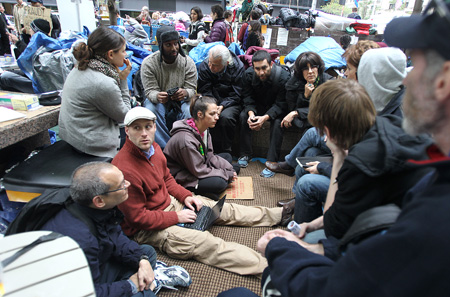 |
Occupy Wall Street: One of the various working groups that meet throughout the day to discuss plans.
AP Photo |
| |
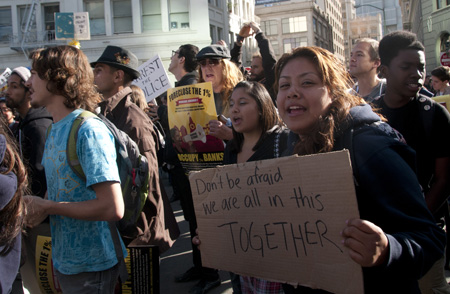 |
Occupy Oakland marching on the day of the general strike.
Revolution photo |
| |
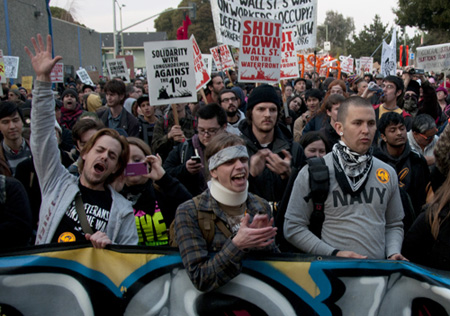 |
December 12—Coordinated actions by West Coast Occupy movements disrupted, and in some cases shut down, ports up and down the West Coast. These actions by thousands and thousands, were a significant continuation of resistance to the heartless and oppressive domination and way of life under this society. The actions also represented a powerful response by the Occupy movement to a coordinated nationwide effort by authorities to attack and crush the movement with police raids and brutality, and to coerce the movement into acceptable channels.
Above, a general strike in Oakland had also shut down the port on November 2. Scott Olsen (center-front), an Iraq war vet, is on the front lines after being seriously injured in October by a police projectile canister at Occupy Oakland.
Revolution Photo |
Standing Up Against the Killing of Earth’s Ecosystems
Washington, D.C., August 20-September 3: More than 1,250 people were arrested in sit-ins at the White House to protest the Keystone XL oil pipeline, which would double the amount of oil flowing from the tar sands in Alberta, Canada to the U.S. Gulf of Mexico coast—at a time when the planet’s environment has already been taken to the precipice of major disaster. Tar sands oil extraction and burning is extremely energy intensive, producing three times more greenhouse gas (the main cause of global warming) than conventional oil production. And the larger battle to save the planet from global climate change and the overall ecological emergency is ever-more urgent.
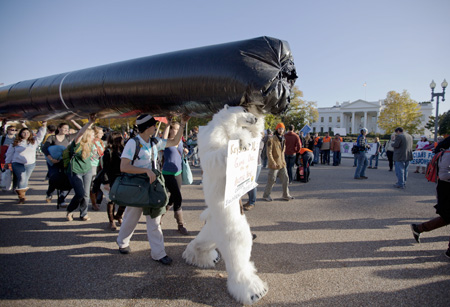 |
Protesters carry a replica of Keystone XL oil pipeline to protest increasing the amount of oil flow from tar sands in Alberta, Canada.
AP Photo |
The System Executes Troy Davis
in the Face of Widespread Protest
Troy Davis, a 42-year-old Black man, had been on death row for 22 years, despite compelling evidence that he was unjustly convicted and sentenced to death. A worldwide movement developed to demand his freedom. Despite this outcry, Troy Davis was executed—murdered—on September 21. The outrageous execution raised deep questions about the legitimacy of the U.S. system. In the spirit of Davis’ final call to “continue the fight,” many hundreds of youth and others took to the streets following his execution.
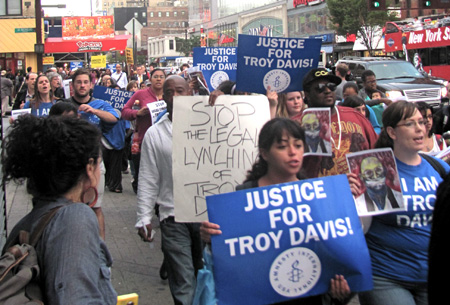 |
| Special to Revolution |
Fighting the New Jim Crow of Mass Incarceration
The United States—the richest and most powerful nation—has 5% of the world’s population, but 25% of its prisoners. More than 2.3 million people are behind bars in the country that brags it is the “leader of the free world”—because the system has criminalized large sections of the people, especially Black and Latino youth. Hundreds of thousands have been imprisoned for simple possession of banned drugs. In prison, people are subjected to horrible, inhumane conditions. After release from prison, millions of people are stamped with a badge of deprivation and shame—denied job opportunities, access to public housing, food stamps, government loans for education, the right to vote, and more. All this is the result of conscious policies adopted by the ruling class. Author Michelle Alexander exposed these profound injustices in her book The New Jim Crow: Mass Incarceration in the Age of Colorblindness. There is a great and pressing need for determined mass struggle against this intolerable situation. This past year saw inspiring resistance against the New Jim Crow of mass incarceration—which must continue and spread in the next year.
STOP Stop-and-Frisk!
The NYPD is on pace to stop and frisk more than 700,000 people in 2011—more than 1,900 people each and every day. The blatantly discriminatory and unconstitutional stop and frisks have been going on for years, and more than 85% of the victims are Black and Latino. Over 90% of them were doing nothing illegal when they were stopped by the police and humiliated, brutalized, or worse. On October 21, an audacious new movement announced itself in Harlem, aimed at STOPPING stop and frisk. Hundreds marched to a police precinct. Then Cornel West, Carl Dix of the Revolutionary Communist Party, Reverend Stephen Phelps from Riverside Church, and about 30 others were arrested in a civil disobedience protest at the police station that broke through significantly in the mainstream media. Carl Dix said about this movement, “We’re going to continue something that’s been started, that has the potential to create a thing where people all across the country are looking at this and saying, ‘You know what those people in New York are doing? We could do that here.’ There is injustice going on all across the country. There are certainly attacks targeted at Blacks and Latinos all across the country. And similar to the way the Occupy Wall Street movement spread like wildfire, we want to create conditions where this can spread.”
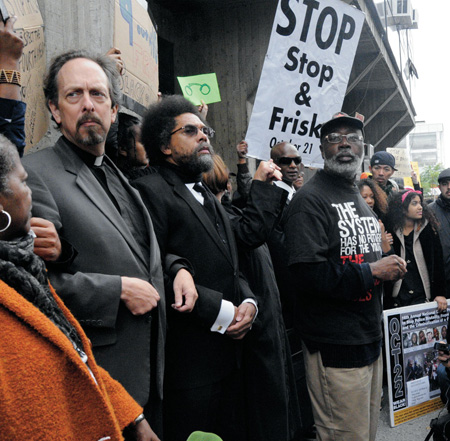 |
| Photo: Li Onesto/Revolution |
October 22 National Day of Protest to Stop Police Brutality
Thousands across the country, determined and fired up, marched and rallied on the 16th National Day of Protest to Stop Police Brutality, Repression, and the Criminalization of a Generation. There were large turnouts for the protest in cities like New York, Seattle, and Los Angeles where Occupy protesters joined forces with families of victims of police murder and brutality. The context for this year’s O22 also included other upsurges of resistance—like the California prisoner hunger strike, outrage against the execution of Troy Davis, and an emerging movement to STOP “Stop and Frisk.” The O22 protests put a focus on the need for continued—and heightened—resistance against accelerating police murder and brutality, sharpening repression on many fronts, and the mass incarceration of 2.3+ million people in the U.S., targeted especially at Black and Latino people.
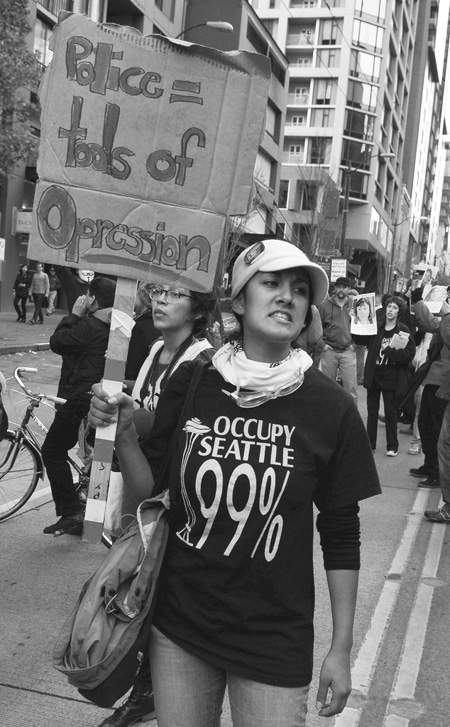 |
| Photo: Elliot Stoller |
Thousands of Prisoners
Go on Hunger Strike
In July and again in September/October, thousands of prisoners in California put their lives on the line and went on hunger strikes, demanding to be treated as human beings. Their protest targeted the barbaric, inhumane conditions throughout the California prisons, especially in the “Security Housing Units” (SHUs) where thousands are held in solitary confinement—conditions that amount to torture. The prisoners are struggling courageously to expose to the world the barbaric conditions in U.S. prisons. Support for these prisoners must not just continue but get stronger, broader, and more determined. There is a responsibility for those on the outside to fight to force the authorities to meet the demands of the prisoners and to stop the punishment and retaliation against the hunger strikers.
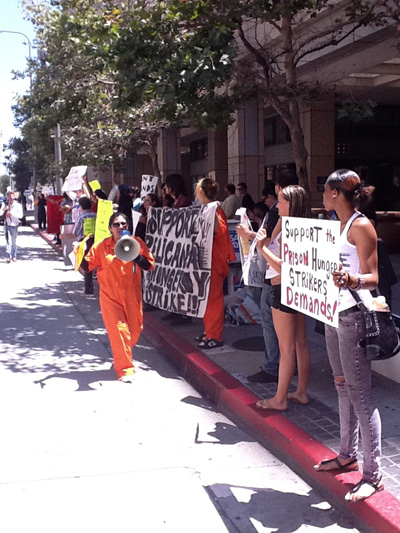 |
| Revolution Photo |
Revolutionary Strategy
Some Principles for
Building A Movement for Revolution
By Bob Avakian,
Chairman of the Revolutionary Communist Party, USA
At every point, we must be searching out the key concentrations of social contradictions and the methods and forms which can strengthen the political consciousness of the masses, as well as their fighting capacity and organization in carrying out political resistance against the crimes of this system; which can increasingly bring the necessity, and the possibility, of a radically different world to life for growing numbers of people; and which can strengthen the understanding and determination of the advanced, revolutionary-minded masses in particular to take up our strategic objectives not merely as far-off and essentially abstract goals (or ideals) but as things to be actively striven for and built toward.
The objective and orientation must be to carry out work which, together with the development of the objective situation, can transform the political terrain, so that the legitimacy of the established order, and the right and ability of the ruling class to rule, is called into question, in an acute and active sense, throughout society; so that resistance to this system becomes increasingly broad, deep and determined; so that the “pole” and the organized vanguard force of revolutionary communism is greatly strengthened; and so that, at the decisive time, this advanced force is able to lead the struggle of millions, and tens of millions, to make revolution.
Fight the power, and transform the people, for revolution. |
Send us your comments.
2011: Inspiring Outbreaks—Crucial Challenges
Download PDF Poster
Chile
Beginning in May, students in Santiago, the capital city, began what mushroomed into massive confrontations with Chilean authorities in cities throughout the country. The student uprising began as a demand to transform the privatized and grotesquely unequal Chilean education system, but became a call for people throughout Chile to rise against the repressive U.S.-backed government. The UK Guardian reported in October that “Chilean students—in many cases led by 14- and 15-year-olds—have seized the streets of Santiago and major cities, provoking and challenging the status quo... since May they have organized 37 marches, which have gathered upwards of 200,000 students at a time.” Youth and others have battled the onslaughts of huge numbers of police who attack them with water cannons, clubs, and tear gas. In October, the Chilean government gave nearly 57,000 18-year-old youth—women and men—one month to report for military duty, in a move that was widely understood to be a blatant attempt to suppress and punish the rebels.
Greece
In May, Greece leaped into turbulent political upheaval that continues today. “Austerity measures”—harsh cutbacks imposed by imperialist financial institutions and implemented by the ruling class of Greece—have meant devastation for the people of Greece: wages slashed, pensions cut or eliminated, public services like transportation, schools, and libraries drastically reduced or done away with, entire sectors of employment eliminated. Enormous protests and occupations have rocked Athens, Salonika, and other Greek cities. Students and other youth have defended themselves against police who are armed with tear gas, stun grenades, and other weapons. Several general strikes that shut down much of the country were joined by working people, professionals, and people from the middle class. Continuing uncertainty over where the harsh measures imposed on the people will lead, and the ongoing resistance of masses, are sending tremors throughout Europe and beyond.
England
In August, youth in cities across England rose up in rebellion against racist police and other injustices after Mark Duggan, a 29-year-old black man, was killed with a shot to his chest as he was pinned to the ground by several cops in the Tottenham district of London. Another factor fueling the rage that broke through in the streets of England is the current government’s vicious “austerity” program. It took the British rulers a massive deployment of police and the arrest of more than 3,000 people to put down the upheaval. Revolution wrote, “What took place in the streets of Britain was a revolt against the hated established order. And the oppressive state that enforces that order is increasingly losing legitimacy in the eyes of millions, among those at the very bottom and more broadly throughout society. And through all the complexity and contradictoriness, one key thing the four days of youth revolt revealed was the potential of the masses of people to not just shake up the existing order, but to radically remake society, IF they have leadership that bases itself on the largest interests of humanity and that has a real strategy for revolution.”
Spain
In May, Spain was about to enter a period of “business as usual” elections. But the normality of day-to-day life was shattered by protests that began in Madrid and then spread, rattling all of society and sending shock waves as well as inspiration throughout the world. Los Indignados—the outraged ones—raised slogans such as “Homeless—Jobless—Futureless—Fearless,” “Our dreams can’t fit in your ballot boxes,” and “System Error—Message from the Spanish Revolution.” Thousands of youth camped out in central Madrid’s Puerta del Sol square and held firm against police attacks. Calls for continuing and extending the protests were spread on social media, and the occupations spread to dozens of other cities across Spain, joined by hundreds of thousands. The Pope was greeted with massive protests when he visited Spain in August. On October 15, a global day of protest called by the Occupy movement, 500,000 marched in Madrid. Today, Spanish society continues to be in deep crisis.
No more generations of our youth, here and all around the world, whose life is over, whose fate has been sealed, who have been condemned to an early death or a life of misery and brutality, whom the system has destined for oppression and oblivion even before they are born. I say no more of that.
Bob Avakian, BAsics 1:13 |
Send us your comments.
A Lesson About Liars
In 2002 and 2003, the President of the United States, the Secretary of State, Secretary of Defense and Vice President insisted that Saddam Hussein's Iraq was pursuing nuclear weapons, that it had chemical and biological weapons and a fleet of aerial drones to deliver them, and that it had ties with Al Qaeda and international terrorism, and was linked to the September 11, 2001 attacks. These claims were backed up by extensive "documentation," "evidence," and lengthy "intelligence findings." The Iraq war, and revelations that emerged about what was going on in the White House at the time, reveal that these claims were total lies, cooked up to justify a war that the Bush regime had already decided to launch.
• • •
In the build-up to the invasion of Iraq, Vice President Dick Cheney twice claimed that CIA director George Tenet told the White House that it was a "slam dunk" that Iraq had WMD. Tenet (who remains loyal to Bush) left the administration, insists Cheney twisted his words, but most revealingly wrote: "There was never a serious debate that I know of within the administration about the imminence of the Iraqi threat," nor "was there ever a significant discussion" about the possibility of containing Iraq without an invasion." In response to claims by Cheney that the "slam dunk" convinced him to go to war against Iraq, Tenet wrote, "As if you needed me to say 'slam dunk' to convince you to go to war with Iraq."
February 2003, Secretary of State Colin Powell told the UN, "The facts and Iraq's behavior show that Saddam Hussein and his regime are concealing their efforts to produce more weapons of mass destruction." Powell played a clip of an audiotape, held up a model vial of poison anthrax, and waved what he said were "2,000 pages of documents" as "proof" of Iraq's WMD program. The U.S. Defense Intelligence Agency had assessed that the source of part of what Powell presented to the UN was "a liar, a fabricator." Powell's chief of staff called his involvement in preparing the speech "the lowest point of my life." The entire presentation defied credibility and would have been exposed as bizarre concoctions had anyone in the mainstream media or politics subjected it to critical examination.
The New York Times channeled Bush regime lies to justify the WMD hoax. Judith Miller's September 7, 2002 front-page story in the Times claimed that metal tubes bound for Iraq were intended to be used to enrich nuclear material. It quoted unnamed "American officials" and "American intelligence experts" and insisted there was evidence that Iraq "stepped up its quest for nuclear weapons and has embarked on a worldwide hunt for materials to make an atomic bomb." The Times, based on feeds Miller was getting from the White House, declared that "Mr. Hussein's dogged insistence on pursuing his nuclear ambitions... [and] Iraq's push to improve and expand Baghdad's chemical and biological arsenals, have brought Iraq and the United States to the brink of war." Shortly after this article appeared in the Times, National Security Advisor Condoleezza Rice, Secretary of State Colin Powell, and Secretary of Defense Donald Rumsfeld all appeared on television and pointed to the Times story [which the administration itself had concocted, fabricated, and fed to the Times] as a significant motive for going to war.
The Democrats misdirected the anger of people who opposed moves toward war on Iraq into voting, but the main and dominant leaders of the Democratic Party, including Hillary Clinton and Al Gore, promoted the WMD lies. Hillary Clinton claimed, "If left unchecked Saddam Hussein will continue to increase his capability to wage biological and chemical warfare and will keep trying to develop nuclear weapons."
All along, the reality that "intelligence" reports about weapons of mass destruction and links to Al Qaeda were "fixed" to justify an invasion of Iraq was no secret within U.S. and allied top political and diplomatic circles. The "Downing Street Memo," prepared by British intelligence to convey what they were being told by U.S. officials, summarized: "[George W.] Bush wanted to remove Saddam Hussein, through military action, justified by the conjunction of terrorism and WMD. But the intelligence and facts were being fixed around the policy."
• • •
The WMD claims were—simply put—absurd. But voices that questioned the WMD lies were attacked, shut down, marginalized, and threatened.
When UN weapons inspector and former U.S. Marine intelligence officer Scott Ritter questioned WMD claims on CNN, host Paula Zahn ridiculed Ritter, attacked him as unpatriotic, and introduced him with an insulting comment about Ritter "drinking Saddam Hussein's Kool-aid." Ritter had the gall—in the eyes of CNN—to point out that "[W]e have the Bush administration talking the talk of disarmament, talking the talk of weapons inspections, but the walk—the walk they're walking is of regime removal."
Former Ambassador Joseph Wilson and his wife Valerie Plame, a CIA agent, were attacked and had their lives threatened for exposing elements of the WMD hoax, including the lie that Iraq had bought weapons-grade uranium in the African country of Niger.
Phil Donahue was fired from MSNBC for questioning the WMD lies. In spite of the fact that he had the highest-rated show on MSNBC at the time, and that MSNBC was positioning itself as the liberal or "progressive" network, his show was cancelled in February 2003. A leaked NBC document said Donahue "presented a difficult public face for NBC in a time of war... He seems to delight in presenting guests who are anti-war, anti-Bush and skeptical of the administration's motives." In a post-firing interview, Donahue observed, "We were the only antiwar voice that had a show, and that, I think, made them very nervous. I mean, from the top down, they were just terrified."
• • •
A 2006 survey published in the British medical journal Lancet found that there had been more than 650,000 "excess Iraqi deaths as a consequence of the war" to that point. And more than 4.7 million Iraqis had been driven from their homes.
No nuclear or high-tech chemical or biological "weapons of mass destruction" ever turned up in exhaustive searches of Iraq during and after the U.S. invasion.
The people who run this country wouldn't recognize the truth if they had a head-on collision with it.
Bob Avakian, BAsics 4:9 |
Send us your comments.
December 14, 2011
U.S.-Israeli Assault on Iran Escalates, Danger of War Grows
by Larry Everest
While the possibility of an Israeli military strike on Iran has hardly dented the headlines in mainstream U.S. media, it is ominously real, and growing. And ground is being laid in the daily headlines and statements by politicians of every stripe in mainstream U.S. politics to justify such an attack—with unsubstantiated assertions about Iran's nuclear program, and gross distortions about which of the clashing oppressive forces in the region is the dominant threatening oppressor and bully.
* * *
In early November, Prime Minister Benjamin Netanyahu and Defense Minister Ehud Barak were reportedly actively "trying to muster a majority in the cabinet in favor of military action against Iran." A few days later, Israeli President Shimon Peres warned that such an attack was becoming increasingly likely. ("Netanyahu trying to persuade cabinet to support attack on Iran," Haaretz, November 2, 2011)
On November 8, the International Atomic Energy Agency (IAEA), an imperialist-controlled international body monitoring nuclear activities, issued a new report on Iran, claiming that "Iran has carried out activities relevant to the development of a nuclear explosive device." The U.S., Israel, Britain and France, seized on the report to call for more diplomatic, political, and economic aggression against Iran—while explicitly leaving the military option "on the table."
A few days later, on November 12, massive explosions rocked a base near Tehran where Iran's ballistic missiles were being developed. Seventeen people were killed, including a top ranking Iranian military official. This follows the assassination of Iranian nuclear scientists, an attack on Iranian nuclear facilities by the Stuxnet computer worm earlier this year, as part of what Roger Cohen of the New York Times called almost certainly a "covert American-Israeli drive to sabotage Iran's efforts to develop a military nuclear capacity." Cohen concludes, "An intense, well-funded cyberwar against Tehran is ongoing." ("Doctrine of Silence," November 28, 2011)
On November 21, the U.S., Britain and Canada imposed new, more punishing sanctions against Iran's central and commercial banks, with the U.S. also announcing sanctions against Iran's nuclear and petrochemical industries. These moves are aimed at cutting Iran off from the international banking and financial system and crippling its economy.
A week later, on November 29, pro-regime Iranian protestors stormed Britain's embassy in Tehran in retaliation, prompting Britain to formally break diplomatic relations and close down Iran's embassy in London. On December 1, the U.S. Senate and the European Union also passed new sanctions against Iran.
The latest flashpoint was the early December downing of a U.S. RQ-170 Sentinel surveillance drone in eastern Iran, 140 miles from the Afghan border, possibly due to an Iranian electronic counter-measure against the drone flights. This sparked a flurry of speculation in the U.S. media over whether Iran—or Russia and China which have ties to Iran—could gain any military advantage from studying the near in-tact drone. The blatantly aggressive and illegal nature of this violation of Iranian sovereignty and airspace, and how drones could be part of any military attack on Iran, was pointedly not part of imperialist press discussion. Iran rebuffed President Obama's request to return the unmanned aircraft, and warned Afghanistan not to permit further U.S. drone flights over its territory. "Until this week, the high-altitude flights from bases in Afghanistan were among the most secret of many intelligence-collection efforts against Iran," the New York Times (December 7, 2011) reported, "part of an increasingly aggressive intelligence collection program aimed at Iran."
"[A]cross the region the largely hidden 'cold war' between Tehran and its enemies is escalating fast, bringing with it wider risk of conflict," reports Lebanon's Daily Star. "From proxy wars in Iraq and Syria to computer worm attacks and unexplained explosions in Iran—to allegations of an assassination plot in Washington—a confrontation once kept behind the scenes is breaking into increasingly open view." ("New cold war with Iran heats up Middle East, raises risk of conflict," December 6, 2011)
The Imperialists Real Nuclear Concern: Preserving Their Unchallenged Military Superiority
The U.S.-European-Israeli charge that Iran is trying to obtain nuclear weapons, which could then plunge the region into a nuclear conflagration, has been the central justification for imperialist aggression against Iran. When the IAEA report was released, the U.S. media called it "definitive" proof of these claims.
But on closer inspection, the report contained no such proof. Instead it was largely a rehash of unproven suspicions and allegations along with "evidence" refuted years earlier. Investigative journalist Seymour Hersh concluded that the IAEA report was a "political document," not an objective report, and that "no evidence" has been produced "of a facility to build the Bomb."("Iran and the I.A.E.A.," New Yorker, November 18, 2011; see also, "New Threats of U.S.-Israeli Aggression Against Iran," Revolution #251, November 27, 2011)
Why are the U.S. and its allies stepping up their attacks even if there's no proof Iran is attempting to build nuclear weapons? Because the core issue has never been whether or not Iran is actually trying to build a nuclear weapon. The U.S. and Israel's real concern has always been that even if Iran gained the technological know-how for a nuclear weapons program—or was seen to have crossed that "threshold,"—it would undermine the perception of unchallengeable U.S.-Israel military regional supremacy, thus strengthening Iranian influence and undercutting U.S. imperialist dominance.
From that logic—the logic of a big time gangster worried about a small time gangster infringing on his turf—even allowing Iran to continue its nuclear power program is seen as dangerous.
The failure, to date, of the U.S.-European-Israeli covert war and international pressure to force the Islamic Republic of Iran to halt its nuclear program, or to weaken its grip on power, is helping drive the escalation of tension and increasing the chances that the imperialists will turn to more extreme measures, possibly including war.
A Battle for Regional Dominance on Rapidly Shifting Terrain
The nuclear issue, however, is not the underlying factor intensifying the U.S.-Iran clash. That conflict is part of something much larger: a sharpening battle for dominant influence across the entire region, a battle with profound global implications.
The U.S. full court press against it isn't aimed at ridding the region of nuclear weapons (if so, they'd demand Israel dismantle its 150 plus nuclear warheads), or liberating the people. The U.S. rulers are going after the Iranian regime because it's become a major impediment to their continued hegemony over the Middle East. And for over 60 years, control of this region has been a central pillar of their global power and the functioning of world capitalism. As the reactionary Weekly Standard put it, the U.S. rulers have viewed "a favorable balance of power in the greater Middle East as key to a favorable international order." ("Iran's Clock Ticking," December 19, 2011)
But what is that U.S.-dominated "international order"? It is an imperialist system that has caused unimaginable and ongoing suffering and violence—including in the Middle East. To cite but one of many examples, according to a 2006 survey published in the British medical journal Lancet, the 2003 U.S. invasion and occupation of Iraq caused more than 650,000 "excess Iraqi deaths as a consequence of the war" up to that point. It also led to over 4.7 million Iraqis fleeing as refugees either inside or outside their country. (See "U.S. Threatens Another War: Who Is the REAL Aggressor in the Middle East?" Revolution #253, December 18, 2011.)
Regional confrontations escalating fast—becoming harder to control
The Iranian regime has never sought to fully break out of the framework of global capitalism-imperialism, but rather to increase Iran's leverage and reach within that framework, which is linked to preserving their oppressive rule over the Iranian people. In that context, Iran's rulers have their own needs and ambitions, including extending their influence across the Middle East and beyond.
Scan the regional map and you'll find a complex, sometimes behind-the-scenes, battle pitting the U.S., a global imperialist superpower which has strangled the region's peoples for decades, against Iran and its allies. This conflict—which is evident in Palestine, Lebanon, Syria, Iraq, Egypt, and the Persian Gulf—has grown much sharper over the past year as uprisings throughout North Africa and the Middle East, clashes between Iranian-aligned and U.S.-backed forces, and big power interventions shake up the regional political order.
In some instances, the U.S. seems to be maintaining its hold, even gaining ground. Its key ally, Saudi Arabia, intervened in Bahrain to suppress an uprising and shore up the solidly pro-U.S. regime there. The U.S. and its allies succeeded in toppling the Qaddafi regime in Libya and seem to have strengthened their hand there. The solidly pro-U.S. army remains the dominant factor in the Egyptian regime. And in Syria, the U.S. is increasingly supporting the uprising against the regime of Hafez al-Assad, a key Iranian ally. One U.S. analyst states, "changing Syria's orientation away from Iran would be a major coup from America's perspective." ("Why Iran might be worried by Hillary Clinton's meeting with Syria exiles," Christian Science Monitor, December 6, 2011)
In other instances, Iranian aligned forces seem to be gaining ground. Iran greatly strengthened its position in Iraq in the wake of the U.S. invasion of Iraq and the overthrow of Saddam Hussein. Now, the U.S. rulers are extremely concerned that their withdrawal will further increase Iranian influence. "[T]he U.S. withdrawal from Iraq will create a power vacuum that the Iranians are eager to exploit," the imperialist think tank STRATFOR notes. "The potential for Iran to control a sphere of influence from western Afghanistan to the Mediterranean is a prospect that not only frightens regional players such as Israel, Saudi Arabia and Turkey but also raises serious concerns in the United States ... [which is] seeking to curb Iran's sphere of influence by working to overthrow the Syrian regime, limit Iran's influence in Iraq and control Hezbollah in Lebanon. ("The Covert Intelligence War Against Iran," STRATFOR Global Intelligence, December 8, 2011)
Iran and U.S. ally Saudi Arabia are fighting "an intricate cold war" across the region, "competing for dominance in global energy markets and nuclear technology and for political influence in the Persian Gulf and the Levant. ... The Iranian-Saudi rivalry has also expanded beyond Iraq and into the greater Middle East, especially in the wake of the Arab Spring." Advances by one bring aggressive counter moves by the other. "A proxy Saudi-Iranian war in Iraq represents a very considerable threat to oil supplies," the Daily Star reports. "Many such confrontations across the region appear escalating fast—and becoming much harder for Washington and its allies to control." (Mohsen M. Milani, "Iran and Saudi Arabia Square Off—The Growing Rivalry Between Tehran and Riyadh," Foreign Affairs, October 11, 2011; Daily Star, December 6, 2011)
Regional changes have the potential to threaten Israeli interests, including fueling mass protest and rebellion against Israel's crimes against the Palestinian people, creating further international support for the Palestinians, and contributing to the strength of Islamist forces (for instance in Egypt, Tunisia, and Libya).
In an article that cites and draws on a number of recent statements by key figures in the Iranian, U.S., and Israeli ruling classes, British journalist Patrick Seale writes, "The danger is that Prime Minister Binyamin Netanyahu may now seek to break out of Israel's current political isolation by mounting a spectacular attack on Iran." ("Will Israel Bomb Iran?" Agence Global, October 11, 2011)
A U.S./Israel Attack on Iran Would Be a Huge Crime
Efforts by the U.S. imperialists to contain, weaken, even overthrow Iran's current regime have been underway since well before President George W. Bush launched the "war on terror" after the attacks of Sept. 11, 2001 which escalated the U.S. campaign against Iran. War on Iran has been debated at the highest levels of the U.S. government. So far, the U.S., Israel and their allies have calculated that the outcome of such a war would be very uncertain. It may neither topple the Islamic Republic, nor stop its nuclear program, while possibly triggering regional upheaval on a level the imperialists could not control. But these difficulties do not change the U.S. and Israel's need to confront Iran, so they've worked to cripple it through sanctions, diplomacy, and covert operations.
That the U.S., its allies, and Israel routinely carry out such aggression short of all-out war is outrageous and calls for much more visible opposition inside this country. And more, the fact that previous threats to attack Iran have not come to pass should not lull people into a false sense that the U.S. and Israel are just bluffing or using these threats merely to strengthen sanctions and diplomacy. Nor should the fact that Barack Obama not George W. Bush is Commander in Chief of the empire, and that the U.S. is drawing down from Iraq and Afghanistan.
The trajectory toward confrontation between the U.S. and Iran has not only continued, it has become more intense. Sanctions, diplomacy and covert actions can lay the groundwork—including in public opinion—for war. And Iran's ongoing nuclear program, the U.S.'s inability to achieve its objectives in Iraq and Afghanistan, the upheaval across the Middle East, and the sharpening of different contradictions globally, are all increasing the necessity facing the imperialists to avoid another setback and to maintain their hold on the Middle East. So circumstances can shift the U.S. and Israel's calculus of the risks and benefits of war.
And wars, including "covert wars," have a logic of their own, and things can get out of control. There are many flashpoints between the U.S.-Israel and Iran, and clashes, even accidental clashes, can quickly escalate in a spiral of action and counter-action.
Stepped up intervention against Iran—no matter how the U.S., Israel, and the United Nations attempt to justify it—is criminal aggression in the service of continued imperialist control of the planet. Anyone who wants to see an alternative to the "choices" between U.S. imperialist domination and aggression, and the reactionary forces represented by the Iranian rulers, must confront and act on the reality that support for, or passive complicity in the face of a U.S./Israel attack on Iran would strengthen both sides of this unacceptable paradigm. And, on the other hand, resistance to U.S./Israeli aggression could be part of bringing forward a radical alternative to both imperialism and Islamic fundamentalism on a global scale.
Any military attack or war on Iran would be a huge crime that would likely result in many, many killed and wounded along with enormous devastation. People, especially in the U.S., have to say—loudly, clearly, and actively—NO!
Send us your comments.
Coming Soon!
C-SPAN Broadcast of Carl Dix—Cornel West Dialogue at UC Berkeley
Between now and the end of the year, C-SPAN will be broadcasting the entire December 2 dialogue between Carl Dix and Cornel West at UC Berkeley—"In the Age of Obama... Police Terror, Incarceration, No Jobs, Mis-Education: What Future for Our Youth?" Thousands turned out for this extraordinary evening. One student called it "incredibly powerful." A UC administrator said it was "Fantastic, the best event ever at UCB. It was well-timed with what's happened, it was intellectually challenging, emotionally touched people and relevant." (See "The Cornel West–Carl Dix Dialogue at UC Berkeley: Thousands Turn Out For Unprecedented, Transformative Evening")
It's urgent that many, many more people be able to see this breakthrough event. Because the broadcast schedule is not yet set, and may appear very shortly before the Dialogue is aired, readers should stay closely tuned to C-SPAN's website so that you can let others know, and organize viewings in homes, classrooms, or at Revolution Books if possible. (For C-SPAN's broadcast schedule, go to www.c-spanvideo.org/videoLibrary/print-schedule.php)
Send us your comments.
BAsics for Prisoners:
GIVE THE GIFT THAT GIVES!
The Prisoners Revolutionary Literature Fund has received an additional $1,000, enough funds for 800 copies of BAsics for prisoners, of which 700 have already been mailed. Thanks to the generosity of people who have stretched to give—from $5 to $500—PRLF is advancing towards our goal of 2,000 BAsics to prisoners. $10 sends one copy of BAsics to a prisoner, including shipping. $12,000 will meet the goal of filling requests for 1,200 more copies.
Donate now to get BAsics to women prisoners. PRLF has a goal of reaching out to women prisoners who are not yet aware of the unique literature PRLF offers, and sending BAsics to at least 200 of the women who respond. $2,000 will cover those 200 books. Your generous contribution will make this happen.
One recent donor, a young man whose father is in prison, explains why he gave to PRLF:
“I’ve recently made a donation of $100 towards one of your campaigns. I made this contribution because I see the necessity of helping these inmates change and be transformed. Not just for the betterment of themselves but for the message it will show us in society that even under these horrendous conditions, people haven’t lost their humanity and can change for a greater cause than one’s own individual gain. And I thank the PRLF for not losing that insight and staying strong and focused on educating and transforming these inmates. I will continue to contribute every chance I get, because these are our brothers and sisters in there, and they should never be cast off. In solidarity with the inmates and all positive social movements for the betterment of humanity.”
YOUR GIFT CAN BE TAX DEDUCTIBLE
How to Donate
PRLF is a project of the International Humanities Center, a non-profit public charity, exempt from federal income tax under section 501(c)(3) of the IRS code. Tax-deductible and other donations can be made online at www.prlf.org. Make tax-deductible checks payable to: IHCenter/PRLF. Make other checks or money orders payable to PRLF.
Mail all checks and correspondence to:
Prisoners Revolutionary Literature Fund
1321 N. Milwaukee, #407, Chicago, IL 60622
PRLF: contact@prlf.org (773) 960-6952
Send us your comments.
Letter from Prisoner on Occupy Oakland
Salutation to all my revolutionary communistic brothers and sisters in arms, and in no uncertain way we want all opposition to know the symbol of change, and let them know it is definitely coming.
The dying system of police brutality, and their bullcrap is being so easily seen and felt all over the world. And in being a native of Oakland I feel privileged in being exposed to the construction period of the Black Panther Party, what they stood for and those alike, and I am more than certain that their call has proven to be the moral fiber beneath my every ambition in fighting for a new government today. Equality and true justice is the simple shaping for everybody to be somebody of stature.
Oakland has always been a sleeping giant, and on the day the OPD riot teams decided to dismantle our encampment the joker popped up on them and divine will and order stept in and the police and riot team decision to move in on our encampment was declared unfit according to the mayor of Oakland. Making them guilty of mishandling themselves and the public in that situation which amounts to another clearly seen and observed act of police brutality.
And its very sad to see how leadership and authority who live in shock and fear of making decisions that will help society need to be removed simply because either they will do nothing to benefit the people or either use the authority and power to continue disrespecting the rights of others and hurting people unjustly like in the dismantling occupied Oakland where my brother sustained a life threatening injury from a tear gas can he was hit in the head and loss his ability to talk and will never be the same again.
When the police is in violation it is outright misrepresentation of both self the department, society, city, state etc. and that point their relationship with their job of justice is cut off and they are somehow incapable of recognizing fair judgement on real life terms simple because they for whatever reason may appear to be caught up in the big me little you syndrome, the image that says right or wrong I'm in control and I don't have a problem forcing substance to my image, at all costs regardless to if its right wrong true or real. Low and behold the new revolutionary communistic party is alive and we are not going anywhere. They will try and stop us but we will never stop until the government fall, and the revolution party will rise up and make it a better world to live in. I am so happy I am part of the communist revolution and I can make a different in the world. We need to get out and spread the word about the revolution. If we have to camp out with the people and go door to door and stand on the corner and feed the homies whatever it take. I know it is not going to be easy but we have to try.
Send us your comments.
West Coast Occupy Port Shutdowns
December 12—Coordinated actions by West Coast Occupy movements disrupted, and in some cases shut down, ports up and down the West Coast. These actions by thousands and thousands were a significant continuation of resistance to the heartless and oppressive domination and way of life in this society. The actions also represented a powerful response by the Occupy movement to a coordinated nationwide effort by authorities to attack and crush the movement with police raids and brutality, and to coerce the movement into channels considered acceptable by the system.
A statement from Occupy Oakland calling the actions a success said: "On Monday, December 12, in response to police attacks on Occupy camps across the nation, the Occupy Movement effectively shut down sea ports up and down the West Coast, including in Oakland, Portland, Seattle, and Longview, with partial shutdowns or support actions at Long Beach, San Diego, Hueneme (Ventura County), and Vancouver, B.C. ...
"The coordinated shutdown, with support by Longshore workers, Teamsters, and independent truckers, demonstrates the continuing vitality and widespread appeal of the Occupy Movement."
In many cases, the overwhelmingly nonviolent civil disobedience actions on December 12 were again attacked by police, while mainstream media railed against Occupy for supposedly "hurting the 99%" by preventing some workers from working! This claim is particularly ridiculous and shameful in light of the massive unemployment, budget slashes, foreclosures, and immiseration enforced on people by the workings of this system.
Almost every official media report made the point that the protests were not called for by the dockworkers' unions. But in every situation and despite lack of official approval, there were dockworkers and others who showed support for Occupy. Many workers refused to cross picket lines and demonstrated support for the protests in many ways, from joining in, to honking in support, to issuing statements to the press.
In Oakland, 5,000 Occupy protesters and supporters successfully shut down the fifth largest container port in the U.S. When the shutdown was announced, occupiers danced and celebrated and chanted, "Occupy will never die. Evict us, we multiply!"
In Seattle, business at major port terminals was at least disrupted and partially shut down by protests and pickets. The protests in Seattle were brutally attacked by police with flash-bang grenades, beatings, and arrests.
According to Los Angeles Indymedia, 500 people shut down Terminal J of the Port of Long Beach, south of L.A., for several hours. Terminal J is the home of terminal operator SSA Marine. The police attacked the occupiers with batons, percussion weapons, Tasers, and dogs.
The following are a report from the Bay Area Revolution Writers Group on the Oakland port shutdown, and a correspondence from a reader on the Seattle action.
Oakland
The action began at 5:00 am in order to stop the shift starting at 7:00 am. More than 1,000 set up picket lines at the gates of a number of shipping companies. Some of the protesters set up a tent in the middle of the street. Picket signs said, "Shut Down Wall Street on the Waterfront." No trucks or workers were allowed to enter the docks. Riot police gathered and formed a line inside the gates. By 9:00 am, two hours after the shift was supposed to start, the ports were declared closed by a union arbitrator.
That afternoon, a second wave of protesters marched from Oscar Grant Plaza (officially known as Frank Ogawa Plaza) in front of Oakland City Hall, where an Occupy camp had twice been evicted and where protesters had faced off against police firing tear gas and projectiles a few weeks ago. Several thousand protesters marched from the plaza to the port and were joined by hundreds more who marched from a rapid transit station.
In the front of the march was Scott Olsen, along with members of Iraq Veterans Against the War and Veterans for Peace. Olsen, an Iraq War veteran, was critically injured in late October when police fired a projectile at him at extremely close range during the eviction of Occupy Oakland. Olsen, who wore a neck brace, was quoted in the San Francisco Chronicle saying that he was at the port protest "to help keep spreading the truth and standing up for what's right."
As the march neared the port and organizers announced that the port had been ordered closed and workers were told to stay home, people celebrated, climbed on trucks, blasted music, and danced in the street.
Protesters held a General Assembly at the Hanjin terminal at the port and decided to continue their blockade into a second day by picketing during the 3:00 am shifts as a response to violence against blockades in other cities. The 3:00 am action also succeeded in shutting down the port.
More than 1,000 copies of Bob Avakian's "A Reflection on the 'Occupy' Movement: An Inspiring Beginning... And the Need To Go Further" were distributed at the demonstrations along with Revolution newspaper and copies of the book BAsics, from the talks and writings of Bob Avakian.
A statement from Occupy Oakland exposes a campaign by Oakland City Council members De La Fuente and Schaaf, who introduced an emergency resolution calling on Mayor Quan and the City Administrator to "use whatever lawful tools we have, including enforcement of all state laws and local municipal code regulations and requirements, to prevent future shut downs or disruptions of any port operations."
Occupy Oakland organizer Barucha Peller said, "Threats of even greater repression by Oakland officials illustrates that they are more concerned with protecting business as usual for the one percent than addressing the concerns of the rest of us."
The Occupy Oakland statement says, "The divisive and repressive tactics of elected officials, global corporations and police goons will only strengthen our resolve to fight back with direct action, because we know that another world is possible."
Seattle
This was a powerful day for the people. Hundreds started the march and others joined in on the route, swelling our numbers to at least 1,000. It was a fairly diverse crowd, young and old, and all nationalities. Some onlookers appeared curious or apprehensive. But many, including sports fans, motorists, and truckers waved or honked. The main target at the Port of Seattle, having the bulk of the shipping this day, was Pier 18. On our arrival, the Pier 18 entrance was surrounded and shut down. People also took the main road fronting the Pier 18 entrance, and here the police attacked and made arrests on the road, using the procedure of first throwing people to the ground and on their faces and kneeling on top of them while binding their arms behind their backs. The frontage road was thus cleared, but the pier itself was shut down!
A call then came for 200 people to go to Pier 5, as it was the key to shut down the night shift. This was successfully done, but reduced forces at Pier 18 enough that the police were able to launch an attack on Pier 18 with horses, stun grenades, and tear gas, making many more arrests. These people were treated unjustly. A clergyman has written, "An officer pulled me down from behind and threw me to the asphalt ... he pressed a knee to my spine and immobilized my arms behind my back, crushing me against the ground. With the right side of my face pressed to the street, he repeatedly punched the left side of my face."
Copies of Revolution were gotten into people's hands and there was much discussion about Occupy being the start of something that can go much further, about revolution vs. reform, and what the word "revolution" really means.
After the port shutdown and further exposure of their brutality, the Seattle police held a press conference to claim they had been viciously assaulted by protesters throwing bricks, paint, and rebar and compared the protests to those that shut down the World Trade Organization in 1999. Police representatives released video claiming to document this, most of which seems to show the brutality of the police themselves on nonviolent protesters, and called for people to snitch to turn in Occupy protesters. This is taking place right after release of a Justice Department investigation that documents at least in part a pattern of SPD brutality against ordinary people, especially oppressed nationalities.
Occupy Seattle responded to the attempts by police to justify and increase their brutality against occupiers in a statement. It noted the pattern of brutality by SPD and said of the SPD actions, in part, "This is a bold-faced attempt to chill free speech and has the potential of opening up those persons to discrimination for their constitutionally protected political views. The violence that took place at the port demonstration was not at the urging of OS and our members, but instead was left to the Seattle Police Department, which used flash-bang grenades and brutally beat dozens of citizens, including a member of the clergy.... Occupy Seattle condemns and denounces this specious move to discredit this movement."
Send us your comments.
Call for volunteers to transcribe interviews for the film, Occasioned by the Publication of BAsics: A Celebration of Revolution and the Vision of a New World
Calling volunteers to transcribe interviews for the film, Occasioned by BAsics: A Celebration of Revolution and the Vision of a New World. We're halfway through the interview process with artists and others who took part in the event last April which this film is based on. These are fascinating explorations of why this range of artists took part in this important event. In order to develop the film further, we need your help! We need volunteers who can transcribe these interviews. You can be anywhere in the country, but need some basic typing skills and Internet access. If you're interested, or know someone who might be, contact basicsevent@yahoo.com.
Send us your comments.








